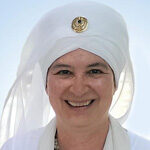by SS Dr. Shanti Shanti Kaur Khalsa, Espanola NM
Winter 2020
Sometime in the mid-1970s, the Siri Singh Sahib defined “understanding” as “standing under.” Now, perhaps more than ever, we are called to go within, to become still, to resonate and to calibrate with what this means. How does “standing under those we serve” affect our words, actions, and relationships in daily life?
Like many of you, since the beginning of 2020 I have been hearing from individuals looking for an assurance that I think as they do. It can be about whether to wear a mask or not, or whether to be vocal or quiet about reports of harm from former staff and students of Yogi Bhajan; about opinions on matters of national politics and the like. Often their voices carry scarcely articulated emotions—like a distress signal—amidst a rapidly changing world that may feel like a world that is falling apart.
Helpful Responses
I became concerned about the polarized voices coming through and wondered what would be helpful in response. I came to these areas of awareness:
To stand under/understand does not mean that we agree with the other person. After all, each of us is Saibhang, a sovereign soul, with our own experiences and ways of being. In fact, it is not even necessary to agree in order to understand.
Further, polarization is not a result of disagreement. It is a result of disconnection. When we disconnect from each other, when we see each other no longer as sangat members on the same path, or members of the same community, or same country, or same planet, we create polarity.
What if instead, we listened? The most meaningful action we can take in service to another is to be present with them. When we dare to witness the pain that animates the words and behavior of another person, yet maintain our stillness and connection, then that power of our awareness initiates a transformation.
In other words, when we recognize the other person is Saibhang, a sovereign soul capable of their own inner guidance, we don’t need to say what we think. Instead, by our steady, accepting presence, we help them restore their own self-regulation—their inner compass.
Thus restored, the distress diminishes and their clarity, self-trust, and inner guidance return. It is our compassionate presence, our ability to deeply listen, accept, and stand under that steadies the wobbly compass in the other person—not our inspiring words, personal life experiences or beliefs.
When I put this awareness into practice, I noticed something extraordinary. People who were angry, distrustful, afraid, aggressive, profoundly saddened, or unmoored, became more calm, understanding, patient, and themselves present for others. After this, did we come to share the other’s way of thinking? No. Instead, we came to understand and appreciate one another and be with one another.
A New Set of Skills
We are in a New Age and we need a different set of skills. One of these skills is to hold another where they want to be held, even—perhaps especially—when we don’t agree. May we gather together, determined to understand each other, not to convince each other. Crucially, may we agree to start giving attention to the distress of the other person and listen deeply in order to stay present even when we are uncomfortable or want to react.
May our message be, “I stand with you, and for you—for each of you, for all of you, with acceptance of you, as Saibhang.”
About the Author
 SS Dr. Shanti Shanti Kaur Khalsa was ordained as a Sikh Dharma Minister in 1973 and has served as Assistant Secretary of Religion of Sikh Dharma since 2000 supporting the Office of the Secretary of Religion in building a global grassroots Ministry. She travels and works with Ministers around the world and is a member of the Sikh Dharma Ministry Newsletter team. She is also a member of the International Khalsa Council and an Officer of the Sikh Dharma International Board. By profession, she is a Medical Family Therapist with a Ph.D. in Health Psychology. She serves as Executive Director of the Guru Ram Das Center for Medicine & Humanology founded by Yogi Bhajan to bring Kundalini Yoga into healthcare and was trained by him as a Kundalini Yoga Therapist. She is a charter member of the International Association of Yoga Therapists and serves on its Advisory Board. Dr. Khalsa travels the globe to bring the International Kundalini Yoga Therapy Professional Training, an accredited program held in four regions worldwide, to 48 countries.
SS Dr. Shanti Shanti Kaur Khalsa was ordained as a Sikh Dharma Minister in 1973 and has served as Assistant Secretary of Religion of Sikh Dharma since 2000 supporting the Office of the Secretary of Religion in building a global grassroots Ministry. She travels and works with Ministers around the world and is a member of the Sikh Dharma Ministry Newsletter team. She is also a member of the International Khalsa Council and an Officer of the Sikh Dharma International Board. By profession, she is a Medical Family Therapist with a Ph.D. in Health Psychology. She serves as Executive Director of the Guru Ram Das Center for Medicine & Humanology founded by Yogi Bhajan to bring Kundalini Yoga into healthcare and was trained by him as a Kundalini Yoga Therapist. She is a charter member of the International Association of Yoga Therapists and serves on its Advisory Board. Dr. Khalsa travels the globe to bring the International Kundalini Yoga Therapy Professional Training, an accredited program held in four regions worldwide, to 48 countries.


